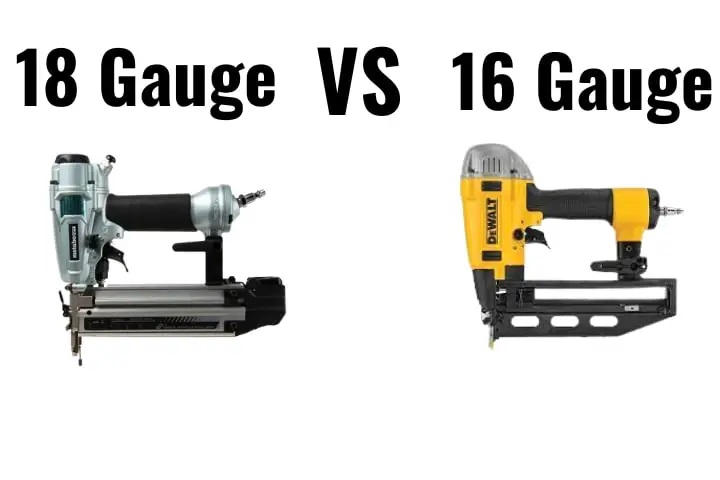16 vs 18 Gauge Nailer – It seems that these two are eternal rivals in the garage of the nail gun. Selecting the right nail gun is the key challenge for the DIYers or pros. Involvement in DIY projects or woodworking will define your professionalism.
In simple terms, “Gauge” means the thickness of the nails. A 16 gauge nailer shoots thicker nails for more holding power. On the other hand, an 18 gauge nailer drives thinner nails for delicate work. A higher gauge will result in a thinner nail size.
There are various types of nail gun sizes are currently existing in the market. Generally, 15 and 16-gauge nails are used in finishing nailers. 18 gauge nails are used in brad nailers. Identically, 23 gauge nails are used in pin nailers.
Choosing them depends on material type, required strength, and finishing line work. In this guide, I will walk you through the distinctions, best uses of them, pros and cons, and so on of both of them. Let,s dive in!
Know About 16 Gauge Nailer
It is a versatile tool that shoots medium-thick nails. They are sturdy enough for heavy materials and minimize the risk of splitting. They are useful for establishing door and window casings, furniture building, and baseboards.
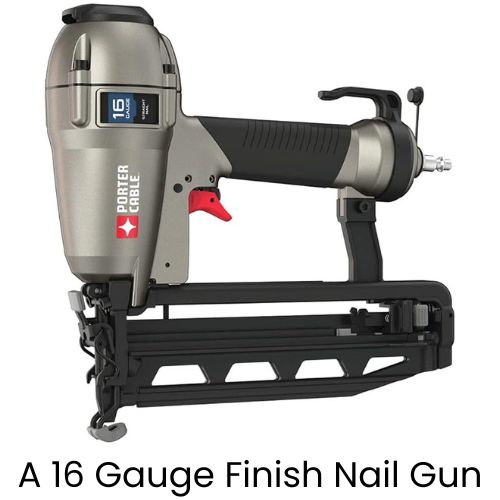
A 16 gauge finish nail gun fires around 1.6mm thick nails (Thicker than 18 gauge nails). The nails typically range from 1″ to 2.5″, which is perfect for deep penetration. The nails of this nailer often leave small visible holes that may need to be filled with putty.
This tool will be your go-to choice where durability and strength matter the most. It is ideal for projects that require secure holding power.
Moreover, if you want pure aesthetics or minimal damage to the materials, you may need other alternatives.
Advantages of 16 Gauge Nail Guns
- It provides better stability and enhanced support
- Extra-holding power keeps things intact
- Perfect for joining planks
Disadvantages of 16 Gauge Nail Guns
- Not suitable for temporary assembling
- Works relatively poor with thin materials
16 Gauge Nail Gun Pros & Cons
Every nail gun meets pros and cons or strengths and weaknesses. Let’s go through them to have a clear vision.
Pros
Strong Holding Power
The nails of 16 gauge nail guns are thicker and have more potential which provides a secure grip for heavy materials. A 16-gauge pneumatic finish nailer works well with hardwoods, and MDF (Medium-Density Fibreboard).
Versatility
It is a versatile tool. It is suitable for various range of tasks, from baseboards or crown molding to door casings, furniture assembling, and cabinetry works. Moderate thickness of a 16 gauge finish nailer is ideal for many finishing jobs.
Deeper Penetration
These nailers offer deeper nail penetration even in heavy materials compared to 18-gauge nailers. They can drive nails up to 2.5 inches, which makes them appropriate for structural integrity, such as stair treads or handrails.
Availability
16 gauge nails are widely available in most hardware stores for different tasks. You do not need to worry about needing more nails to accomplish your job.
Minimization of Nail Pop-Out Issues
These nailers have less possibility of nail pop-out. They are less likely to loosen or pop out over time. Even in areas of vibration or movement, it can minimize the nail pop-out issue easily.
Less Splitting
They are thinner than 15-gauge nails and less likely to split delicate materials such as baseboards or moldings. Offers a good middle ground between strength and subtlety.
Compatible in Pneumatic & Cordless Version
They are available in both pneumatic and cordless versions. It gives flexibility to the users based on their jobs. The cordless version is also known as the electric finish nailer 16 gauge or 16 gauge battery nail gun. The pneumatic version is also known as a 16 gauge air nail gun for its air compressor.
Glue for Extra Strength
A 16 gauge nail for a nail gun works well with glue to create extra strength. Glue is often used to ensure double-secure joints. This marvelous combination allows the pieces to stay together permanently even in temperature changes.
Cons
Large Nail Holes
Since these gauge tools shoot thick nails, they create larger holes compared to 23 gauge nails. It can be a key drawback of this tool where cleanliness and aesthetics are essential. So, to prevent visible larger holes you require wood filler or putty. It will help you make a smooth finish.
Heavy & Bulky
They tend to be bulky and heavier. It may cause fatigue during long projects. Because of its extra size, it is very tough to fit in tighter or corner spaces. For perfect fitting in tight and corner spaces, you require smaller nailers.
Not Suitable for Delicate Tasks
The thicker nails and stronger grips can damage delicate trim works and hamper delicate materials, like softwood surfaces, and veneers.
Higher Cost
16 gauge nailrs are more expensive than 18 gauge nailers. The nails and equipment of this nail gun are very costly. If you opt for some high-quality tools like a cordless 16 gauge finish nailer, it will be costlier upfront.
Blow Out on Thin Materials
If it is used in thin materials, the nails may blow out on the backside as well as push out unevenly and split the wood. They are not ideal at all for fine detail work.
Rigidity
Heavier nails or fasteners can limit the flexibility of the materials. In some cases, if the project requires wood to expand or slightly move it might not be ideal for its rigidity.
Jam Risks & Maintenance
If you use low quality and the wrong nail length jams are more likely to occur. It may interrupt the workflow, especially for the pro users. So, proper oiling or lubrication and regular maintenance are essential.
Our Top 16 Gauge Nail Gun Pick
If you’re looking for a 16 gauge nailer, we recommend you check out the NuMax SFN64 Pneumatic Nail Gun.
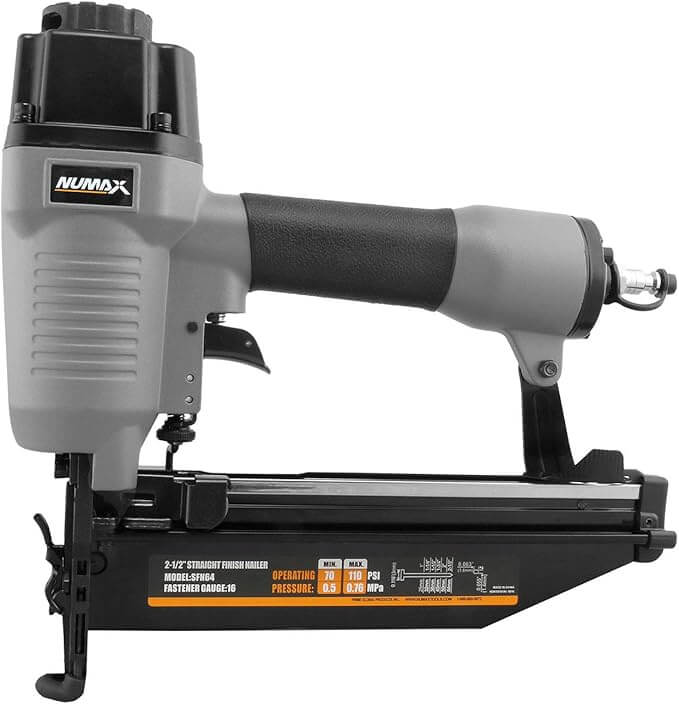
NuMax SFN64 is a lightweight four-and-a-half-pound machine with a durable aluminum body and an ergonomic handle. NuMax SFN64 is the best affordable 16 gauge nailer you have in your hands.
This nail gun also contains a quick jam release that cleans the magazine without taking the whole thing apart. NuMax SFN64 fires 16 gauge finish nails falling under the bracket of 1-2.5 inches.
Better known for its exterior finish and interior woodworking, it specializes in dealing with cabinetwork, crown molding, and window cases. Firing nails is super fun with a high magazine capacity of a hundred nails. The sturdy-looking body built on aluminum ensures excellent durability for the years to come. Being Lightweight, you will never feel fatigued working for long hours with this nailer.
Know About 18 Gauge Nailer
An 18 gauge nailer, also known as a brad nailer, is a unique tool designed to drive 1.2mm-thick nails into wood or other materials. The nails that are to fit into this nailer are also called 18 gauge brad nails. They have minimal heads.
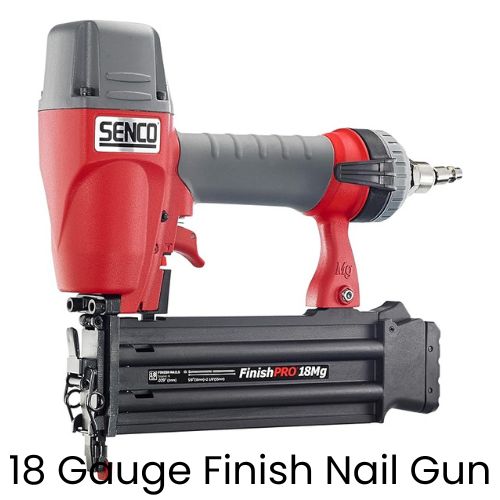
18 gauge brad nails are less likely to split wood, giving an excellent finish to the tools. As such, the 18-gauge nailer is perfect for trimming, molding, picture frames, and other detail work. If you are doing lightweight woodworking such as picture framing, narrow trim fitting, or others that require detailed working, the 18-gauge nailer is the best bet
Perhaps the 18-gauge nailer is exactly what you are looking for if your project calls for something more exact and requires a seamless completion. it is extremely versatile. It drives thin 1.2mm brad nails to handle delicate woodwork.
Advantages of 18-gauge nailers
- Minimize the risk of cracking through thin surfaces
- It holds thin constituents amazingly
- Perfect for delicate tasks
Disadvantages of 18-gauge nailers
- Inability to penetrate highly dense materials
18 Gauge Nail Gun Pros & Cons
Pros
Minimal Wood Splitting
The 18 gauge brad nails are thin compared to 16 gauge nails. They reduce the risk of spitting or cracking thin wood or other thin materials. They are ideal for softwood, veneers.
Lightweight
These nailers are compact and easy to handle. It helps you reduce fatigue during long projects. They are easier to maneuver in corners or tighter spaces.
Precise Fastening
These nailers offer highly precise fastening while attaching small components, such as photo frames. They are ideal for glue reinforcement.
Versatile Options
The 18-gauge nailers are available in both pneumatic and cordless versions. An 18 gauge pneumatic brad nailer is mostly used in factories, workshops, and other inside jobs. On the contrary, an 18 gauge cordless nail gun (Same as an 18 gauge battery nail gun) is mostly used in outdoor jobs for its movability.
Nail Length
They work well with the length of the nails. The nail length widely ranges from 5/8″ to 2″. This range of nail lengths adds more versatility to this power tool.
Reduces the Need of Clamps
An 18 gauge nailer can act as an ideal fastener, where you typically rely on clamps to hold glued pieces together. It saves time and effort both.
Reduces Over-shooting Risks
18 gauge brad nails are thin and lightweight compared to 16 gauge nails. The thinness of these nails reduces the risk of overdriving nails deep into the materials. It assists in preventing surface damage and creates a smooth finish.
Perfect for Finishing
Since 18 gauge nailers leave little marks, it is ideal for pre-finished wood like laminating or painting trims. It exposes a polished look without excessive touch-ups.
Quiet Operations
18 gauge nailers produce less noise than other framing or finish nail guns. This feature makes it perfect for indoor use without disturbing your neighbors.
Easy Nail Removal
Often if you need to remove any 18 gauge brad nails, it will not cause any major damage to the material. It can be a good choice for small adjustments or repairs during assembly.
Less Risk of Bouncing
18 gauge nails are lightweight and thin. They reduce the risk of material bouncing and shifting. These tools apply less force, which causes less risk of shifting and bouncing during fastening.
Cons
Limited Holding Power
18 gauge nails are thin, that do not provide the same grip as 15 or 16 gauge nails. This is why they are not ideal for structural projects or heavy-duty work like door and window casing.
Shallow Nail Penetration
The nails reach a maximum length of about 2 inches, which restricts their application for deeper penetration into the thicker materials or hardwoods.
Nail Pop-out
Because of the thinness of nails, they can loosen or pop out over time. It can happen especially on hard materials vibration or movement.
Reloading Frequency
18 gauge nails come in smaller strips, which require reloading nail frequency. it indicates that you need to reload nails more frequently during larger projects. It can be disruptive for the pro workers.
Not Weather Resistant
Brad nails are not suitable for outdoor use due to their thinner design, which makes them more prone to corrosion in outdoor environments. Even galvanized nails struggle against moisture and harsh weather conditions.
Jamming Frequency
The small diameter of 18 gauge brad nails can lead to jamming in the nailer, particularly when using lower-quality nails or strips that aren’t aligned correctly. This can interrupt your workflow.
Not Grabbing Properly
If nails are not driven properly, they might not hold onto certain materials (such as MDF or Plywood), resulting in loose pieces. This necessitates extra caution during use and could lead to increased rework time.
Irrelevant Results on Rough Surfaces
The 18-gauge nailer is most effective on flat surfaces; it might not deliver reliable results on irregular or bumpy materials, where thicker nails would offer better grip.
Less Compatibility of Heavy Fasteners
The 18-gauge nailer is less versatile than 16-gauge or framing nailers because it can’t accommodate larger diameter nails, making it suitable only for light-duty tasks.
Our Top 18 Gauge Nail Gun Pick
If you’re looking for an 18 gauge nailer, you may like the DEWALT DWFP12231 Nail Gun.
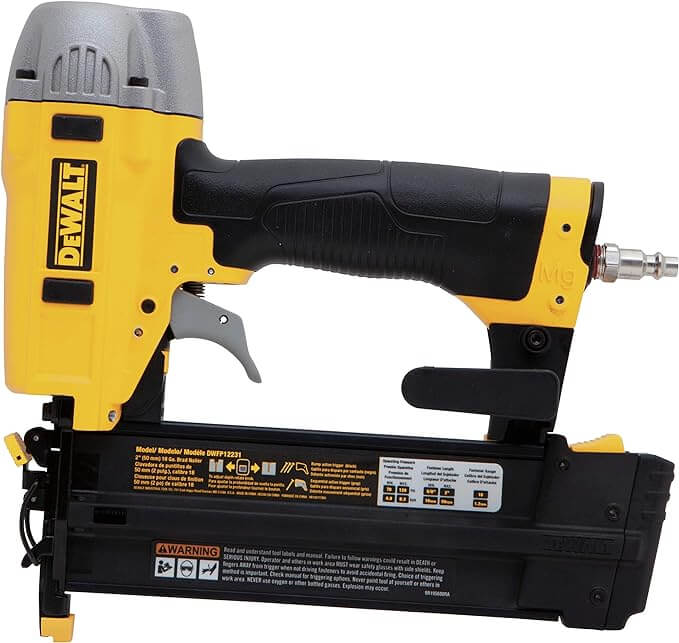
With a lightweight, compact design and sturdy black reliable magnesium body, this nail gun under the trademark of Dewalt delivers exceptional performance in firing eighteen gauge nails ranging from 5/8 inches to 2 inches in length.
The tool-free-depth adjustment, and tool-free jam clearing, let you adjust the nail depth and maintain cleanliness without any hassle. The rear exhaust doesn’t allow the contamination to deteriorate the body. Also coupled with the long-life maintenance-free motor, and ensures a stainless workspace.
Since It Weighs 2.6 pounds, you will find no difficulties while working for hours in congested spaces without any fatigue. With the integrated rubber ergonomic grip at the handle, Dewalt guarantees a perfect nailing experience with this amazing nail gun.
Comparisons: 16 vs 18 Gauge Nail Gun
Driving/Penetrating Capacity
While many nail guns can drive 2-inch nails in various conditions, there are plenty of situations where you need to drive nails deeper. The 16-gauge nailers, being thicker than the 18-gauge types, offer better penetrating power, reaching about 2.5 inches compared to the 2 inches of the latter.
Both options are quite capable; it ultimately comes down to the specific tasks you need to accomplish with them.
Stability and Reliability
Yet again, 16 gauge nailers provide better stability according to the holding power. It can prevent a collapse even between a few meters thick planks. It is nothing like the 18 gauge nailers falling behind in the parameter since both are intended for different tasks.
But it becomes slightly inconvenient to hold surfaces when they get any thicker with the former gauge type.
Versatility
Well, both of them are versatile in their own way. The 18 gauge is far superior since it gives a lot more creative options to explore in the detailing work. The 16-gauge nail goes perfectly fine when you deal with thicker surfaces.
Weight
16 gauge nailers are heavier and bulkier, which causes fatigue during large projects. On the contrary, 18 gauge nailers are lightweight than the other one. It is appropriate for detailed tasks where precision matters.
| Type of Nailers | Weight of Pneumatic Version | Weight of Cordless Version |
| 16-Gauge Nailer | (3.5 – 4.5 lbs) or (1.6 – 2 kg) | (5.5 – 7.5 lbs) or (2.5 – 3.4 kg) |
| 18-gauge nailer | (2 – 3 lbs) or (0.9 – 1.4 kg) | (4 – 6 lbs) or (1.8 – 2.7 kg) |
18 or 16 Gauge Nail Gun – At A Glance
| Features | 16-Gauge Nailer | 18-Gauge Nailer |
| Holding Power | Strong holding power | Less holding power |
| Best Use | Door casing, window casing, heavy trim | Small trims, molding, furniture |
| Material Suitability | Compatible for hardwoods and MDF | Best for softwood and delicate materials |
| Nail Hole Appearance | Leaves larger visible holes, need putty or wood filler to cover up the holes | Minimal holes, not very visible, no need for wood filler |
| Hinge Install | Ideal for lighter hinge installation | Not recommended at all for installing hinges |
Final Words on Nailer 16 Gauge vs 18
Having various distinctions helps clarify the requirements for choosing between a 16 gauge and an 18 gauge nailer effectively. A 16 gauge nailer offers better value for money due to the range of materials you can assemble with it
A 16 gauge nailer can be too heavy-handed for tasks that require finesse and precision. That’s where 18 gauge nailers come in handy. One of the great advantages of using an 18 gauge nailer is that the holes it leaves behind are nearly invisible! In contrast, a 16 gauge nailer tends to leave a more noticeable mark. Ultimately, it all comes down to what you need for your project today.
FAQs
Can you use 16-gauge nails in an 18 gauge nailer?
Ans: You cannot use 16-gauge nails in an 18-gauge nailer. Each type of nailer is specifically designed to work with a certain gauge of nails. In this case, you will face some difficulties, such as nail slot and firing incompatibility, tool damage and jamming, malfunction, etc.
What is PSI for an 18 gauge brad nailer?
Ans: The ideal PSI (Pounds Per Square Inch) for an 18-gauge brad nailer usually lies between 70 and 90 PSI. You can measure the exact PSI based on your materials. Experts suggest that softwoods like pine, and spruce require 70 – 80 PSI. Hardwoods like oak and maple require 85 – 90PSI. MDF or plywood requires 80 – 90 PSI. Thin and delicate trim starts at 70 PSI.
How to load 18 gauge brad nailer?
Ans: Loading an 18-gauge nailer is very simple. Just follow the below-mentioned steps:
Step 1: First, disconnect the air compressor if it is a pneumatic model. Remove the battery if it is a cordless or battery model. It guarantees safety.
Step 2: Open the nail magazine gently.
Step 3: Align the nails into the magazine track. Make sure the sharp tips are facing downward, and the heads are leveled with the top of the track.
Step 4: Gently press the magazine shut until you hear a “click”. Ensure it is securely locked.
Step 5: Reconnect the air compressor while using pneumatic, and insert the battery while it is cordless.
Step 6: Check twice that the nailer firing properly on any piece of scrap wood. Test the nails are seated at the depth of the material. Then BOOM!
Is an 18 gauge Brad nailer good for the baseboard?
Ans: Yes, they can be used for installing baseboards. But it depends on the type of baseboard. While 18-gauge nails are thinner and less likely to split the material, they don’t offer the same holding strength as 16-gauge nails, which might be necessary for thicker baseboards.
What is the diameter of a 16 gauge nail?
Ans: A 16-gauge nail has a diameter of about 0.0629 inches (1.6 mm). Whereas, an 18 gauge nail has a diameter of 0.048 inches approximately.
Can you use 18 gauge nails in a 16 gauge nailer?
Ans: No, You can’t operate 18-gauge nails in a 16-gauge nailer. Nail sizes are not compatible. Their thickness and designs are different. You will face some difficulties like jamming or misfire issues, tool damage, internal component damage, and also safety hazards.
Can I use 18 gauge nails for trim?
Ans: Yes, they are fine for trimming works. Specifically ideal if you are working with lightweight, smaller, and delicate pieces.
Which one is suitable for beginners? 18-gauge nailers or 16?
Ans: 18-gauge nailers are the better choice for beginners, as it is light in weight, easy to control, and less likely to damage. For professionals, possessing both tools provides flexibility.
Which nailer should I buy first? 18-gauge nailers or 16 gauge?
Ans: It is totally up to your assigned project. If you work with heavier baseboards, doors, and window casing, you should buy a 16 gauge nailer. On the other hand, if you are involved in lighter tasks like photo frames, or small decorative tasks you should buy a 18-gauge nailer.
What is the price of these power tools?
Ans: Undoubtedly, 16 gauge nail guns are more expensive than 18-gauge nailers. Moreover, prices may differ based on the brand, model, and versions (Pneumatic or cordless).
Happy Choosing, Easy Nailing!!!

